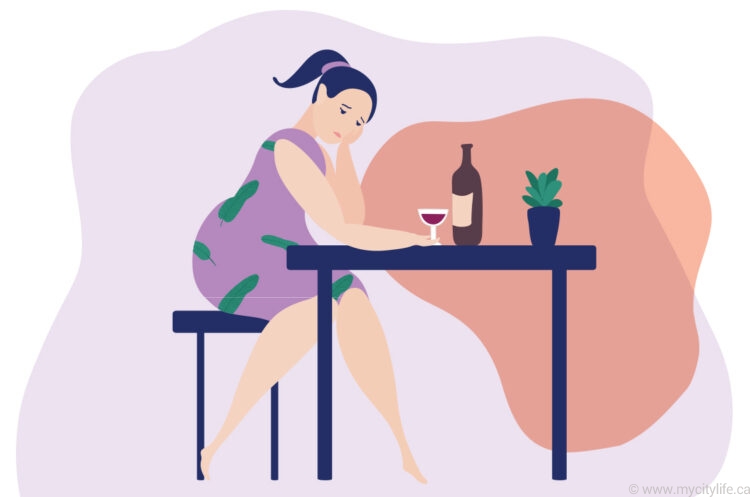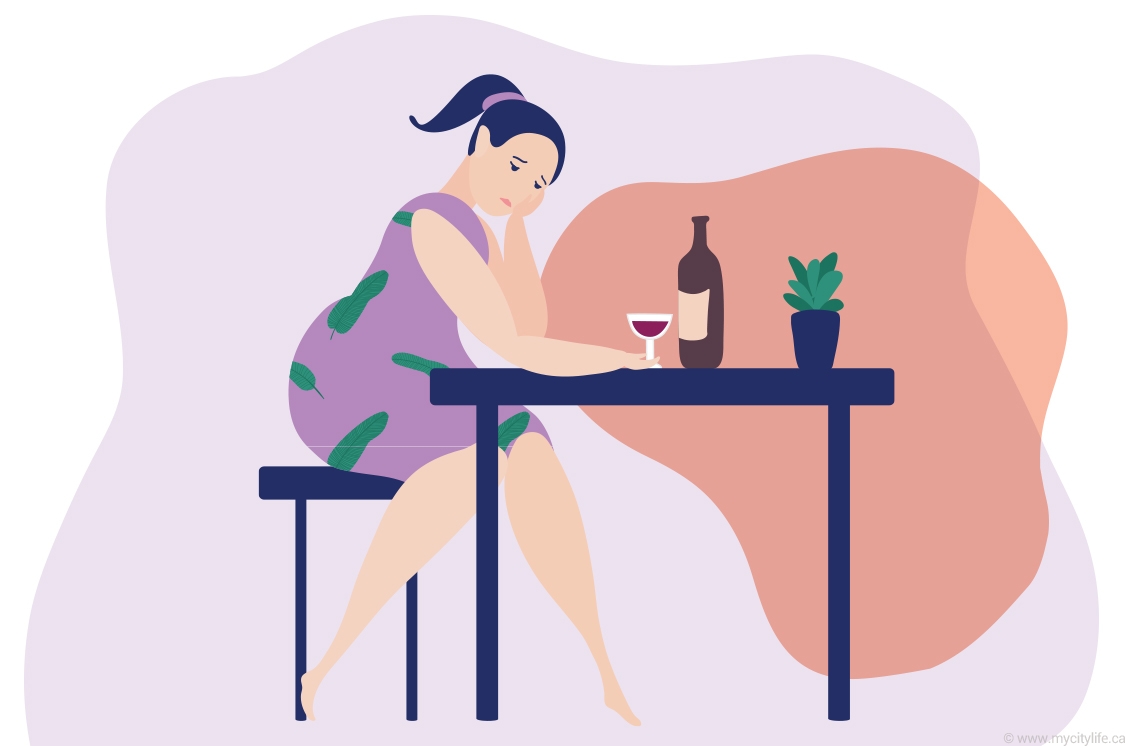Dr. Jennifer Wyman: Pandemic Drinking
Dr. Jennifer Wyman, an addiction specialist from Women’s College Hospital, speaks on the relationship between women and their increased alcohol consumption during the pandemic and their potential risk of developing breast cancer.
Think of a time when you had a moment to breathe. For many of us, those moments have been few and far between since the beginning of the COVID-19 pandemic. In a pre-pandemic world, we may have taken for granted the little moments of time to reflect on our day and mindlessly revel in a quiet setting. Something as seemingly insignificant as commuting from work to home was a time where we would mentally prepare ourselves for the next part of the day. As mundane as time alone like this may seem, the lack of it may actually be the source of a concerning phenomenon when it comes to the relationship between women and increased alcohol consumption.
Over the past year, there has been a steady increase in both the amount and frequency of alcohol consumption for men and women; however, the risks associated with cancer for women are far more concerning than for men.
Dr. Jennifer Wyman, an addiction specialist from Women’s College Hospital in Toronto, explains. “For women, that’s particularly concerning because the additional risk of alcohol on top of the risk of breast cancer really is a target for women. There’s a study from Journal of the American Medical Association from 2011, and that’s the reference point. They followed over 100,000 women for close to 30 years, and this goes back to 1980. That’s where the numbers really come from when we say that women who drink two drinks a day or more have an increased risk of 50 per cent for breast cancer, and even those who are drinking an average of a drink a day, or three to six glasses a week, still have an increased risk of between 10 per cent and 15 per cent, compared to those who don’t drink at all.”
With women taking on many of the responsibilities associated with working at home, they’ve been juggling more than ever before, with many taking on the role as teacher, schooling their kids at home, all while managing housework, making dinner and trying to spend quality time with their significant other. “The pressure to keep it all together is really getting to people — that, combined with the lack of personal space, and even that small amount of personal time transitioning from a workspace to coming home. Alcohol is being that sort of space to differentiate work life from the second part of the day — or even the third part of the day,” says Dr. Wyman.
Without this clear transition and mental shift, Dr. Wyman further explains her concern: “For some women, drinking has been moved from being in a social setting to then having a glass of wine on their own after the kids have gone to sleep at night. I think it’s the ever-increasing pressure on women to have careers, be great involved parents, look great, manage their household, which, for some, created these stresses and the feeling that there really isn’t anywhere that they can be vocal or honest about the pressures that they’re feeling or let off some of that steam.”
In an April 15, 2020, report commissioned by the Canadian Centre on Substance Use and Addiction (CCSA) during the COVID-19 pandemic, the results of a Nanos poll saw that 25 per cent of Canadians (aged 35–54 years) and 21 per cent of Canadians (aged 18–34 years) say they have increased the amount of alcohol they drink while spending more time at home during the pandemic.
“The pressure to keep it all together is really getting to people — that, combined with the lack of personal space, and even that small amount of personal time transitioning from a workspace to coming home. Alcohol is being that sort of space to differentiate work life from the second part of the day”
Dr. Wyman highlights that both men and women are affected by increased alcohol consumption; however, there a few material differences in the anatomy and psychology when it comes to women. “Women’s livers are more susceptible to the impact of alcohol in terms of the risk of fatty liver and cirrhosis, and women already have an additional cancer risk because of the risk of breast cancer. I think part of what is different now for women is the focus on the ways in which unhealthy drinking has been going on behind the scenes, in a sort of a secret and covert way,” she says. “I think that women are more prone to hiding their drinking because of societal expectations and norms, and that drinking, drinking alone, further contributes to a sense of isolation and shame, and potentially depression, which make it harder to reach out for help.”
The covert ways in which women have been hiding their drinking habits are provoked by both mainstream media and social media, perpetuating false narratives and sensationalizing alcohol consumption. Emerging over the last decade, thanks to social media, “mommy juice” culture, which uses catchy phrases like “I wine because they whine,” has normalized alcoholic behaviour.
This is of particular concern to Dr. Wyman. “I think that equating alcohol and self-care is so problematic, I hardly know where to start. The idea that a drink is a way to manage your anxiety, manage your depression or manage your insecurity diverts people from looking at where those experiences are really emanating from and the healthier ways of approaching them. So, that’s not to say that alcohol is bad and always bad. But alcohol doesn’t treat depression, it actually aggravates depression. And actually, alcohol doesn’t help sleep, it aggravates sleep disorders. The notion that alcohol equals self-care should really be that self-care is about making time and space to do things that really are helpful for you.”
A Feb. 17, 2021, Leger poll commissioned by the Mental Health Commission of Canada and CCSA found that among the general population, there has also been a sharp rise in those experiencing symptoms of depression. That number has risen from two per cent before the pandemic (according to the Canadian Community Health Survey) to 14 per cent. The poll showed that the respondents’ top stressors were their financial situation (14 per cent), social isolation (12 per cent) and the health of family members (11 per cent). With an increased amount of stress, Dr. Wyman suggests being honest with your health-care provider. “If you’re a woman who’s now looking at your drinking and wondering whether it’s gotten out of hand, think about talking to your doctor. Your family doctor or your nurse practitioner are great resources to help assess what’s going on, what type of options there might be and to really look at your other issues, like mood or anxiety — and there are treatments. I think it’s really important for people to know that for people who have developed problematic drinking, there are supports and that there are medications that can help.”
An unexpected positive consequence that has come out of the pandemic has been using virtual care to help people treat whatever health concerns they are experiencing. “For people who don’t live in a big metropolitan area where accessing care is easy, people in small centres or who might need specialized care because of their cultural or linguistic issues, it’s really opening opportunities to connect,” she says. “The same is true for people who might have been nervous about going to a 12-step meeting and did not want to have to walk in and identify and share themselves. There are so many great resources online. In fact, there’s never been more access to online support for substance use and mental health.”
With increased access to health technology, it will hopefully allow people to understand that there are evidence-based treatments that are both medical and non-medical therapies. “I think that all too often there is a judgment that people have somehow chosen substance use, and that it’s just a failure of will or of their moral strength to be able to tackle it. What I’ve learned over time is that so many people with addiction have a history of trauma that they’ve been managing, or trying to manage, by damping down those feelings using substances of one kind or another,” says Dr. Wyman. “So, I’m really passionate about helping people understand that addiction is a chronic health condition that we have treatments for if we can apply them. There isn’t a cure per se, but like with other conditions, we can help people manage and live better and healthier lives.”
While the realities of alcohol consumption trends have been affecting women in a negative way, it is important to understand that there are resources and communities that can help. Simply starting a conversation and destigmatizing the struggles that women (and men) are experiencing, especially during the pandemic, is a good place to start. “I’ll be optimistic and say that the discussions of substance use and mental health that are happening in the media may be opening a door to greater awareness and to a greater likelihood of people actually talking about their experiences and reaching out for help,” Dr. Wyman says.
A hopeful prospect that has emerged from the pandemic has been the opportunity for more people to overcome their fears, face their vulnerabilities and recognize that it is impossible to pour out of an empty cup.

















































































